| |
|

LETER FROM JERUSALEM
Modern-day Isaiahs, Hoseas find plenty
in Israel worthy of their denunciations
By Ira Sharkansky
 JERUSALEM—Judging Israel is no simple task, but this does not keep the simpletons from complaining. We read that Israel is failing to take the steps necessary to protect its people, and failing to explain what it is doing; in Lebanon II, Prime Minister Ehud Olmert, Defense Minister Amir Peretz (who should not have been appointed) and their generals failed; Israel is giving too much to the Palestinians of the West Bank; and is being too strict with the maintenance of barriers; Israel's lack of response to the missiles against Sderot reveals a moral bankruptcy; Israel's quarantine against Gaza, and its frequent incursions to capture or kill represent unacceptable violations of international law. JERUSALEM—Judging Israel is no simple task, but this does not keep the simpletons from complaining. We read that Israel is failing to take the steps necessary to protect its people, and failing to explain what it is doing; in Lebanon II, Prime Minister Ehud Olmert, Defense Minister Amir Peretz (who should not have been appointed) and their generals failed; Israel is giving too much to the Palestinians of the West Bank; and is being too strict with the maintenance of barriers; Israel's lack of response to the missiles against Sderot reveals a moral bankruptcy; Israel's quarantine against Gaza, and its frequent incursions to capture or kill represent unacceptable violations of international law.
It is not easy being an Israeli policymaker, soldier, commentator, or citizen. The pressures are intense, and the constraints awesome. What other country faces chronic efforts to kill its civilians, and lives in the spotlight of international organizations that find it convenient to hold Israel (and usually only Israel) to the highest standards, and might welcome the destruction of Israel?
The country also suffers from its own history and political culture. It is the Promised Land of the Chosen People. Biblical prophets set the standard of intense morality. Nothing by way of realism or compromise in the face of constraints is good enough for prophetic demands in behalf of justice. Different prophets have their own standards of justice, and it is impossible to please one without offending others.
The prophetic insistence on perfection is found not only in the Bible. It appears on the op-ed pages of the country's newspapers, and from commentators heard daily on radio and television.
The prophetic mind set is not the sole possession of right or left.
Prophets from the right demand that Israel maintain control over the whole of the Land of Israel, and proclaim that the sky is falling on account of imperfect concerns for the Jewish people. Often this is the style of Diaspora-oriented fear mongers, or Israeli religious nationalists, who have not thought themselves beyond the shtetl or the Holocaust, or selected passages from the Torah.
The prophetic mind set from the left would hold Israel to the highest standards of openness and fairness to its minorities and neighbors, overlooking the real threats from people who want to kill Jews and destroy the country. Another kind of left-wing rant comes from people who want the best of public services. They demand for Israel what they imagine to be on offer in the richest countries of North America or Western Europe, without taking account of economic constraints. The World Bank ranks Israel among the wealthiest countries of the world, but close to the bottom of that league. It cannot afford to pay for all the goodies promoted by social activists. Moreover, its budget is constrained by the highest proportionate outlays on national defense of any Western country. Prophets seldom ask why.
We hear that higher education is in crisis and getting worse. Yet each of the country's universities appears on a recent list of the 500 best in the world; and one-half of the country's universities appear on a list of the 150 best.
Critics complain that the national health system does not provide all of the latest and most expensive drugs and medical procedures. Patients near death are convinced that they will be saved if health authorities would only be more generous.
Occasionally we hear that medical innovations may be life-extending, but that they are not life saving. If we pay close attention, we may hear that the stuff on demand does not work as desired all the time, or even most of the time.
The facts are that Israelis have shorter waits for physicians or operations than people of Britain or Canada, and its health system renders pitiful what is available to most Americans.
We hear that the inequalities of income are the worst among Western democracies, that the country's drivers are the most dangerous in the world, and that the country's workers are the most likely to be on strike.
None of these claims stands up to a comparison of national statistics.
When an Israeli says that the country is the worst, it is time to think about the prophetic mindset. The speaker who screams imperfection is not likely to be concerned with facts. That the prophet of the moment is a university professor or a ranking politician does not make the nonsense any more true.
On numerous indicators that figure in demands for perfection and claims of misery, the country actually scores somewhere in the middle of the rankings drawn from comparable countries, i.e., those that are western, democratic, and middle- to upper-income.
It is not wise for citizens to criticize their governments from a perspective of micro-management. Democracy is fine, up to a limit. Details are important in shaping day to day decisions and they change from the time of the last election. It may be tempting to throw out the incumbents because they are not governing according to the highest standards, but realities make for difficult decisions. Policymakers cannot know for sure what will happen as a result of one tactic or another. There is likely to be dispute at the summit of any democracy's government. And few democracies face the intensity of demands and constraints focused on Israel.
Israel is, arguably, the most successful of all the countries that came on the scene after World War II, whether measured by the maintenance of democracy, economic development, or the quality of social services. It is not Paradise. Amos, Hosea, Isaiah, and Jeremiah would be disappointed.


Should Jews be modest or flaunt successes?
By Dov Burt Levy
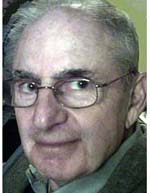 SALEM, Massachusetts—Perhaps like me, you receive e-mails from well-meaning friends describing how accomplished Jews are, as compared with Muslims. SALEM, Massachusetts—Perhaps like me, you receive e-mails from well-meaning friends describing how accomplished Jews are, as compared with Muslims.
It goes like this: Among twelve million Jews, a mere 0.2 percent of the world's population, 126 have received Nobel prizes. Muslims, with 1.4 billion, or 20 percent of world population, have received six. The bottom line, implied or stated, is, "Look how Jews have benefited the world compared with Arabs."
Not surprising that individual Jews would be pushing that information in the west, especially Europe, where prevailing sympathy goes to the "poor" Palestinians, most of whom are Muslim Arabs, and against Israel. Why not advertise our superior contributions to our society as compared with those of our adversaries?
Other Jews, perhaps recalling other times, find such a recitation to be in poor taste, unnecessarily provocative. Besides, they say, Jews live in advanced countries while most Muslims do not.
Even some Muslims are equally impressed with Jewish accomplishment. Islamabad-based columnist Dr Farrukh Saleem, in an article entitled "Why Are Jews So Powerful", states, "For every single Jew in the world there are 100 Muslims. Yet, Jews are more than a hundred times more powerful than all the Muslims put together. Ever wondered why?"
He ticks off a list of Jewish achievement and, in the last paragraph asks, "So, why are Jews so powerful? Answer: Education."
Supporting Saleem's thesis was an Agence France Presse story (January 2008) headlined, "Nearly one in three in Arab world illiterate" reporting that startling figure takes into account the illiteracy of nearly half the women in the Middle East, according to the Arab League Educational Cultural and Scientific Organization.
But there is a problem that gets in the way of improving education for Arab populations: In the Arab states that surround and menace Israel, widespread education would, while improving lives (and maybe producing Nobel prize winners), open the eyes of the people, who could then topple the despotic regimes. And their dictators know it.
Which brings me to the question posed by Rabbi Mitchell Wohlberg, of Beth Tfiloh Congregation in Baltimore, whose October 20, 2007 sermon has been widely circulated.
Rabbi Wohlberg talks about the consequences of facts cited in the October issue of Vanity Fair. An article in that magazine called "The 2007 New Establishment" lists those who, in the magazine's judgment, are America's 100 most powerful and influential people. Fifty-one of the 100 are Jewish, according to a counting by Joseph Aaron, editor of the Chicago Jewish News.
As the rabbi puts it, "this is not a list of shleppers…names like Warren Buffet, Clinton and Oprah Winfrey" are next to names like Spielberg, Bloomberg, Lauder and Weinstein.
Rabbi Wohlberg raises the question of Jewish power and success. Shall we be modest about these facts? Or shall we flaunt our real and perceived success? Perceived success has some advantages as columnist Akiva Eldar wrote in Haaretz, the Arab belief "that Jews rule the world has become one of Israel's most important deterrent factors, no less than its military strength"
The rabbi offers Talmudic references supporting both positions. Jacob, during a famine in Egypt, told his children "when they go down to Egypt don't let the people see that you have bread. And don't all come marching in together as one; people will be afraid of you; people will envy you; people will give you the 'evil eye.'"
On the other hand, says Rabbi Wohlberg, citing Exodus, "describing the garment that was made for the High Priest to wear in the Temple, we are told that the hem of his robe had bells on it so that people would know that he was coming. And the Lubavitcher Rebbe saw this as a lesson that a Jew should go out into this world proud and confident, trying to spread the message."
Thus, the Lubavitcher Chasidim have well-decorated "Mitzvah Vans" and large, public Chanukah menorahs. Says Wohlberg, "from the perspective of the Lubavitcher Rebbe you could say – although he never would have put it this way: 'If you've got it, flaunt it!'"
So, dear reader, let me join Rabbi Wohlberg in asking what you think? Lie low or flaunt it? Are such prominent declarations of Jewish achievement, including wealth and success, good for the Jewish community or not?


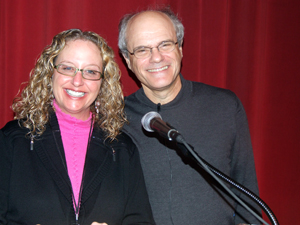 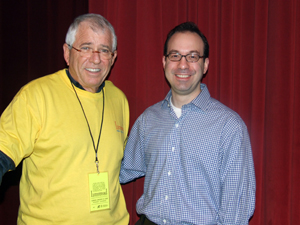
THE JEWISH CITIZEN
Records of Carter and Kennedy toward
Israel scrutinized at annual AJE Limmud
By Donald H. Harrison
 LA JOLLA, California—The records on Israel of two former U.S. Presidents—John F. Kennedy and Jimmy Carter—were examined Sunday, January 27, at the day-long learning session, or Limmud, sponsored by the Agency for Jewish Education at the Lawrence Family JCC. Kennedy came off far better in the comparison. LA JOLLA, California—The records on Israel of two former U.S. Presidents—John F. Kennedy and Jimmy Carter—were examined Sunday, January 27, at the day-long learning session, or Limmud, sponsored by the Agency for Jewish Education at the Lawrence Family JCC. Kennedy came off far better in the comparison.
Carter was the first to come under the microscope in a morning session led by Kenneth Stein, an Emory University professor who served as the first chairman of the Carter Center and who many years later resigned from that institution's advisory board in protest of Carter's 2006 book: Palestine: Peace Not Apartheid.
Stein noted that the groups criticized in Carter's last two books —Evangelical Christians (Our Endangered Values: America's Moral Crisis) and Jews—were important supporters of his election in 1976 over President Gerald R. Ford. However, four years later the support by both groups for Carter diminished when he was successfully opposed by Ronald Reagan. "Is this payback?" Stein asked rhetorically. He said he doesn't know the answer.
What Stein said he did know was that Carter turned some facts about Israel completely around, almost as if he were saying that the sun rises in the west. For example, he said that when Carter met in his post-presidency with the late Syrian dictator Hafez-al-Assad, the discussion turned to a suggestion by Israel's then foreign minister (now President) Shimon Peres that Israel would be willing to withdraw from the Golan if it were demilitarized. Stein said Carter parapharased Assad as having been willing to pull back even farther from the Golan Heights than Israel. However, said Stein, he personally attended that meeting, took notes, and what Assad actually said was that Israel should be required to pull back twice as far as the Syrians.
The professor, who earlier in their association had assisted Carter in the preparation of the book The Blood of Abraham, said that in his most recent book on Palestine, Carter has engaged in "revisionist history" and a "whitewash of Palestinian history." He accused the former president of completely misrepresenting United Nations Resolution 242 as requiring a withdrawal from the territories Israel won in the 1967 war. The resolution, said Stein, sets out the expectation that Israel will get something in return if it relinquishes the territories. Under Carter's formulation, Israel is expected to first give up the territories, and only afterwards, negotiate, he said.
Stein said Carter has such an excellent memory that he was able to quote memos and resolutions verbatim when he lectured to Stein's classes at Emory University, implying that if the words in Carter's current book are twisted, it would not have been because of faulty recollection, but by intention.
As slanted against Israel as the book was, the comments that Carter made on his national book tour were worse, Stein said. And worse still, in his opinion, will be what is said about Israel in a documentary film being made about Carter and his book tour.
The danger of the book is that it already is being incorporated into college curricula, Stein said. Carter's speeches on the Middle East are being accepted by students as true version of the events as related by the 39th President of the United States himself. He said for 18-year-old students, it is hard to believe that a former President of the United States is not telling them the truth, the whole truth and nothing but the truth.
Along with the book The Israel Lobby by Professors John Mearsheimer and Stephen Walt, Carter's has become a weapon in "the intellectual assault on Israel on campus," Stein said.
The professor said much has changed on college campuses from the time when he was a student at the University of Michigan. Today, people don't go to lectures to learn but to hear their positions reinforced, he said. The academic left has moved to the far left. "We used to teach history, now we teach 'narrations'"—the idea that each side has its own version of events, seemingly making history a matter of ideology. Furthermore, he said, there is an absence of people on campus willing or able to speak out for Israel.
* *
Far more cheerful to the ears of an afternoon Limmud audience was Warren Bass's examination of the relationship between Israel and President John F. Kennedy. Bass, book review editor of The Washington Post and author in his own right of Support Any Friend: Kennedy’s Middle East and the Making of the U.S.-Israel Alliance, said he wrote the history because he thought it was a missing chapter in understanding the special relationship between the U.S. and Israel.
He noted that Kennedy's predecessor, President Dwight D. Eisenhower successfully demanded that Israel withdraw from Gaza and the Sinai after its joint campaign with Great Britain and France in 1956 against Egypt under Gamal Abdel Nasser. After the next Arab-Israeli war, in 1967, President Lyndon B. Johnson did not insist upon Israeli withdrawal from the Gaza or the Sinai or any of the other territories taken in that historic conflict. How did the policy of American presidents turn around? The answer, Bass decided, may lie in the foreign policy of Kennedy.
It was a foreign policy fraught with nuance. On the one hand, Kennedy wanted Israel to be able to defend itself against Arab attack, even to the point that he allowed himself to be persuaded by Shimon Peres, then a second-rank Defense Ministry official, to sell U.S. produced HAWK missiles to enable Israel to guard against incoming MIG aircraft (flown by Egypt).
On the other hand, having looked over the brink of nuclear catastrophe in the confrontation with Russia over Cuban missiles, Kennedy did not want to see any nuclear proliferation--and was determined to prevent Israel from developing a nuclear bomb.
At the same time, Kennedy sought to court Nasser, Israel's arch-enemy, whom he did not want to see allied with the Soviet Union. But when Yemen's monarchy was topped by pro-Nasserites, setting off a proxy war between the pan-Arabist leader of Egypt and the nearby monarchies of Saudi Arabia, the Gulf States and Jordan, Kennedy abandoned the wooing of Nasser. In the fight among Arabs, Kennedy felt America's interests lay with the Saudis.
Due to the subtlety of Kennedy's diplomacy, and also in tribute to his and wife Jacqueline's charm, he was a beloved figure throughout the Middle East. In Israel, there is a park-like memorial to Kennedy near Jerusalem. In Egypt,mourners formed lines many blocks long outside the U.S. Embassy after Kennedy's assassination, Bass said.
Kennedy's father, Ambassador Joseph Kennedy, was reputedly an anti-Semite, and a questioner in the audience wondered what influence the father had on the son. Bass related that on one occasion when the Rev. Martin Luther King Jr. was in jail, Senator Kennedy telephoned King's wife, Coretta, to comfort her. On hearing this, King's father, who also was a minister, said he believed he might support Kennedy notwithstanding his concern over Kennedy's Catholicism. In relating the story to friends, Kennedy expressed wonderment that King could have a bigot for a father. Then he paused reflectively for a second, and added. "I guess we all have fathers."
Other questioners wondered whether it has ever been proven that Israel has a nuclear bomb, notwithstanding the general consensus that it does. Bass said that Israel obtained the secrets from France, but that ever since it has pursued a policy of "nuclear opacity." This deliberate unclearness about its capability, he said, was typified by Peres' response to a direct question on whether Israel indeed has the bomb. Peres replied that Israel would not be the first one to introduce nuclear arms in the Middle East, not exactly a responsive answer.
Had Kennedy not been assassinated, what would the U.S.-Israel relationship have been like? Bass was asked. He responded that Kennedy was so intent on preventing nuclear proliferation, he might have forced Israel to choose between Dimona (where a nuclear facility was built) and Washington. He noted that in the last year of his presidency, Kennedy sent a letter to Israel's Prime Minister David Ben Gurion demanding that Israel submit its nuclear program to arms inspections or face consequences to the special U.S.-Israel relationship.
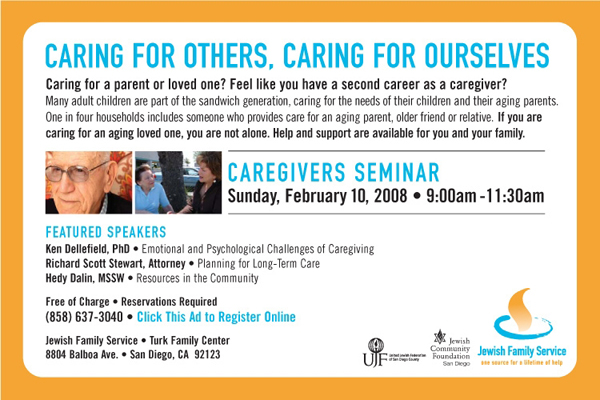

Only Money and Pedigree Will Do
By Sheila Orysiek
Fourth in a series of Bella Family Circle Remembrances
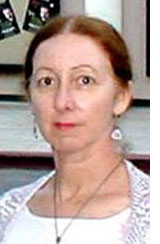 SAN DIEGO—The only way one could be a member of the Bella Family Circle was with the right pedigree (either by birth – a descendent of Great Grandmother Bella - or marriage to a descendent) and money – dues were $1.00 per month per adult. Only members in good standing could attend and/or vote at the monthly meetings, however, I don’t ever recall anyone being asked to leave. I also don’t recall anyone who didn’t pay their dues - or anyone being called to task for not paying their dues. So, it all worked out. SAN DIEGO—The only way one could be a member of the Bella Family Circle was with the right pedigree (either by birth – a descendent of Great Grandmother Bella - or marriage to a descendent) and money – dues were $1.00 per month per adult. Only members in good standing could attend and/or vote at the monthly meetings, however, I don’t ever recall anyone being asked to leave. I also don’t recall anyone who didn’t pay their dues - or anyone being called to task for not paying their dues. So, it all worked out.
When I was a child the monthly meetings were held in the homes of the members with an average of about forty people (out of a membership of 75) attending. This was quite an undertaking for the hosting family as they invariably prepared for a group three times that size. The food was stacked high and became an overwhelming burden in terms of financing, preparing and cleaning up. It also became quite competitive. To correct this situation it was “moved, seconded and approved” to limit the food to “Danish and tea/coffee.”
At my young age I thought “Danish” was a Jewish pastry not a country. My view was further confused when an Aunt decided that “Danish” also included “Napoleon” and another Aunt concluded that “sponge cake” was allowed under the new rules. A social event in a Jewish home couldn’t possibly take place without sponge cake. Pretty soon German Strudel, Russian Strudel, Vienna Fingers, pound and coffee cake met the new rules and then knishes somehow morphed into the definition and soon we were back to tables groaning with food. No one tried to limit it again.
Another attempted solution was to have one family provide the space (their house) while another provided the food. This seemed on the face of it like a good neytzah (solution) until it became evident that the lady of the house was afraid that if the family providing the food didn’t provide sufficiently it would reflect badly on her and so she surreptitiously added food to the table.
Most of the homes were quite small – row houses in the older neighborhoods of Philadelphia, but we all managed to fit in. As the generation of cousins married they bought bigger homes. The year the fashion industry proclaimed clothes and home décor had to be purple (late 1950’s) Cousin Ruth bought a new “split level ranch” (minus the ranch) in the suburbs (minus the suburbs - she was still within the boundary of the city). She decided that all three levels of the house were to be purple. The combination of a split level ranch (which no one in the family had yet seen) and purple interior decor caused one of the largest membership turnouts we’d ever experienced. I often wondered what she did when purple carpets, drapes and upholstery went out of fashion the next year.
When the meeting was at Uncle Al’s house which was over the shoe shop he owned, he managed to sell a few pairs of shoes. At tax accountant Cousin Joe’s house, several members just happened to bring along their income tax forms, which he dutifully looked over after the Bella Family Circle Business Meeting but before the tea and Danish – which kept the line waiting for his expertise short.
The meetings were quite formal with Uncle Israel, the family patriarch, the obvious (and only) choice for president. As the years went by and he was gathered to his fathers, we went chronologically down the list of patriarchs: Uncles Al, Ben, and Wally. It was years before a matriarch took up the mantle. Sitting beside President Uncle Israel was Aunt Bessia as parliamentarian. She had once been president of a synagogue sisterhood and understood the rules of parliamentary engagement and when it was appropriate to “call for the question.” She also had the requisite demeanor (and stature) of a parliamentarian. One didn’t argue with Aunt Bessia.
Aunt Rose, The Younger, (there were two Aunt Roses) was recording secretary because she was able to figure out what constituted “New Business” from “Old Business” – a continuing source of contention. However, definitely part of “New Business” were “simchas” and “mazel tovs.” Announcements were made about engagements, births, bar and bat (bas) mitzvahs, graduations, as well as purchase of a new home or car
When my parents were congratulated on the purchase of a car, Aunt Rose, The Elder, protested that it was a used car and therefore no congratulations were in order. She announced that only new car purchases came under “New Business.” In the fracas that ensued (carefully moderated - but not stopped - by Parliamentarian Aunt Bessia) my Grandfather declared that the purchase of a used car could come under “Old Business.” My Grandfather had clout as he commanded a voting block of fourteen people – his children and their spouses. So, from then on used cars got a “mazel tov” under “Old Business” and new cars under “New Business.” I’m not sure how it worked out with the purchase of new/old houses.
While the eldest uncle was president, the next in age was vice president, and the third in line was the treasurer. The treasury reports were listened to with care. Dues money was used to help defray costs of the Seder Supper, the Annual Picnic , Trip to the Shore and other expenses. It also paid for birthday cards and mailing out the monthly bulletin but it did not pay for the Danish/Napoleon/strudel/knishes.
Cousin Annie was always “Sunshine and Bulletin Chairman.” It was she who sent out the birthday/anniversary/get well cards for the month. She also published the monthly bulletin which was generally a cleaned up rehash of what went on at the meeting minus any contretemps. Her ready smile and laughter made her an automatic “Sunshine Chairman.”
At the meetings, sitting quietly in a corner, never saying a word, but smiling sweetly was a very old lady. She was the widow of an Uncle (even older than Uncle Israel) who had died before I was born and it was years before I figured out who she was and how she fit into the picture. By then she was no longer with us.
When Cousin Chaim attended a meeting (my Grandmother’s cousin) everyone was on a higher level of good behavior. He was greatly respected as a Hebrew teacher and Talmud scholar. While reading the Torah portion that describes Abraham ready to sacrifice his son, Isaac, Cousin Chaim became so wrought up he had a heart attack and died at the Bimah. While we were sorrowed by his passing, we also knew that is probably the way he would have chosen to die.
An adjunct to the Bella Family Circle was The Corporation. This was a mutual beneficial corporation solely held within the family. Shares were $20.00 but could be purchased in increments of $2.00. Against this a member (in good standing) could borrow twice the amount of shares owned at low interest rate. It was understood that a family corporation would never foreclose on a loan, but by the same token family members were very careful to repay loans since it was the money of their cousins, aunts and uncles at stake. Many a family emergency was saved and car purchased through the corporation. It also kept us from having to explain to a bank why we didn’t really need the money we wanted to borrow. Aunts and uncles already knew the whys and wherefores of each family’s financial situation.
This brings me to the year of The Revolt. After consecutive terms of patriarch presidencies, the younger cousins (my parents’ generation) became restive. It’s not that they wanted power, what they really wanted was shorter meetings and longer schmoozing after the meetings. They didn’t want to go home to bed so early. They also wanted the meetings to be held on Saturday evening (Sabbath in summer notwithstanding), rather than Sunday night since they had to get up early to go to work on Monday mornings.
When these suggestions were cautiously – with great respect – amidst protestations of continuing loyalty - brought up at the meeting under “New Business” Aunt Bessia as Parliamentarian declared it should be under “Old Business” because they weren’t new ideas, just a modification of extant procedures. Then President Uncle Israel declared the time for “Old Business” had passed. The Revolt collapsed in the face of such irrefutable logic. But the meetings were now unofficially alternated between Saturday and Sunday nights in the summer. The Revolt of the Cousins went underground.
As for me, The Bella Family Circle was in existence before I was born and so it was always a part of my life until I grew up, married and left Philadelphia for San Diego. I never considered it unusual for a family to meet monthly, have a parliamentarian, etc., – and when I was very young I assumed every family did. I was informed when they celebrated their sixtieth anniversary. I would be one of the elders now as all the adult generation of my childhood is gone. However, I know that somewhere we will all meet again, but I’m not sure if that will come under “Old Business” or “New Business.”


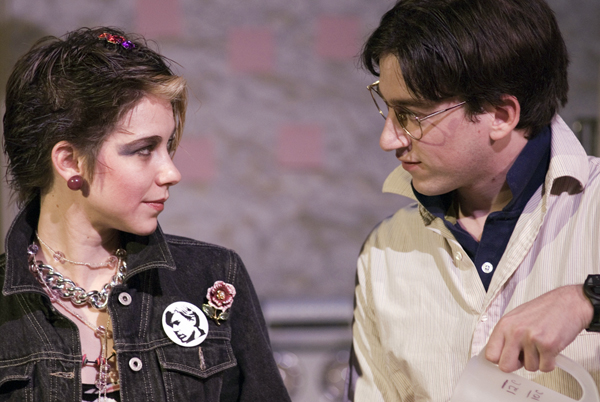
OUR YOUTH—Rachael VanWormer and Tom Zohar play rich students exploring 80s drug culture
ARTS IN REVIEW
This Is Our Youth is high drama, 80's style
By Carol Davis
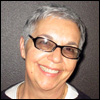 CARLSBAD, California—The mantra, “Do you know where your children are?” kept haunting me as I sat through Kenneth Lonergan’s This Is Our Youth now in a highly charged, emotional production at New Village Arts Theatre in Carlsbad. CARLSBAD, California—The mantra, “Do you know where your children are?” kept haunting me as I sat through Kenneth Lonergan’s This Is Our Youth now in a highly charged, emotional production at New Village Arts Theatre in Carlsbad.
Lonergan began ‘writing when he was just eighteen. He won an award for one of his plays in Stephen Sondheim’s first Young Playwrights Festival in 1982. Other works writing speeches and industrial shows followed which gave him the opportunity to support himself while he pursued his playwriting career, This Is Our Youth was his first notable work of art; the first production of it opened Off-Broadway in 1996. Because the subject of his work speaks to the youth of the 80’s, by “2000, 40% of the audience at the Garrick Theatre in London was under the age of 26”.
This Is Our Youth is set in the 1980’s over a period of three days. Three Jewish early twenty something’s from New York’s Upper West side are headed on a path of destruction, so ensconced in the drug culture of the times, that one had to wonder if they would live to see the 90’s. Everything happens in the bare bones apartment (designed by Francis Gercke) of Dennis Ziegler (Joshua Everett Johnson). Dennis is the pack leader, the brains behind the drug dealing. The son of a famous painter suffering from cancer and a social worker, he is caustic and abusive toward his friend Warren Straub (Tom Zohar). Rather than going off to college, he implores his mother, “Don’t send me to college. Just spring for my rent. I’ll be a … bike messenger till I decide what I wanna do and we’ll never have to deal with each other.” And she does it!
Warren, a college dropout and socially immature is looking for acceptance from his friend Dennis. He is distanced from his wealthy father whom we learn has connections with the mob as well as a high profile lingerie designing business. Warren has no problem stealing $15,000 from his estranged Dad because he threw him out of the house for smoking too much pot. He brings to Dennis’ the money in a backpack as well as a suitcase filled with his collectable. He pleads for Dennis to let him stay, since he can’t go back home. Dennis is afraid Warren’s father will come after them because of his mob connections, but the fear doesn’t’ prevent him from planning to spend the money. He calls his contacts to buy cocaine. With the cocaine the boys will have a coke party and what’s left after the party they plan to sell to recoup the money Warren took from his father, supposedly so his father won’t even know the cash was missing.
In the meantime, while Dennis is out getting the drugs, Jessica (Rachael VanWormer) a fashion design student, who seems to have a tenuous relationship with her mother, comes up to Dennis’ apartment for ‘the party,’ After a few false starts, Warren tells Jessica he has enough money for them to spend the night at the Plaza Hotel, drink champagne and have a glorious night. Off they go while Dennis is partying at a friend’s house. Following a night of partying and high living, Dennis and Warren meet back at the apartment and the dysfunction of their relationship begins all over again spurred by more drugs and tragedy.
Nothing and everything happens in this eye-opening, dark comedy. Insults are bantered about, grass is smoked, politics (it’s the Reagan era) are discussed more drugs are abused, (remember ‘just say NO”) parents and their children are worlds apart, and lives are wasted. But there is always the hope that with their well healed families to back them when they grow out of this stage, they will go on to become replicas of their parents.
It’s a telling look into the lives of those living in the drug culture world of the ‘80’s. Each generation has its demons and rebels. Lonergan “admits the play was inspired by his own experiences while taking a break from college. It’s essentially the life lived by my friends and me on the upper West Side in the ‘80’s”. “We were stoned out of our minds with our parents’ money behind us and a kind of levitating our way through life”.
For yours truly, a product of the 50’s, I found it alien. But under the deft direction of Francis Gercke and this dynamic trio of young actors, I was profoundly drawn into the terrible tragedy of a generation, in particular, a privileged set of bright, talented youngsters who whittled their way through their twenties. Only after one of their own died from an overdose and they experienced death first hand did they see the destruction.
Joshua Everett Johnson, a smart actor if there ever was one, is brilliant as he rips his friend up one side and down the other, constantly belittling him in his choice of girl friends and looks, convincing him that he is right and his friend is wrong most of the time. However, he continued to take his money proclaiming he knows best how to spend it. His performance toward the end of the play as he comes to some reckoning with himself and he breaks down in uncontrollable sobs is a showstopper and one that brought tears to my eyes.
Tom Zohar, with his youthful appearance and innocent brilliance, is picture perfect as the disenchanted yet dependent friend with no direction looking for an adult role model. When he meets up with Jessica, nineteen years old, he goes gaga. VanWormer is just right as Jessica Goldman, defensive, nervous pretending to be hip and someone who cannot be taken advantage of, but somehow is charmed by Warren. Dressed in typical 80’s punk (costumes by Amanda Sitton) and looking trendy for the time with purple hair and leg warmers, she casts a believable aura around her character.
Technical support deserves praise as well. Lighting designer Ashley Jenks and Adam Brick’s sound design bring the much-needed atmosphere to the almost empty apartment design (mattress on floor, book cases, TV on floor, unseen, no pictures, phone with long extension and small kitchen area) of Gercke’s.
At the end of the day, This Is Our Youth is a coming of age story in which each of the characters is having difficulty making the transition from spoiled, over indulged childhood to accepting responsibility and reaching adulthood. Without the help of adult role models, who seem more interested in themselves than their offspring, they have no one to look up to except each other. Each character is examined throughout and reflects, and in a not very positive light, an era of self-absorption and indulgence.
Is youth wasted on the young or do they have to know heartbreak at least once and experience tough growing pains before they take on the adult persona?
Lonergan, whose other works seen here in San Diego include Waverly Gallery and Lobby Hero is someone to be watched, as is New Village Arts Theatre.
This Is Our Youth continues through Feb. 17.
For more information visit NewVillageArts.org or call (760)433-3245
See you at the theatre.
SAN DIEGO JEWISH WORLD THE WEEK IN REVIEW
Shoshana Bryen in Washington, DC: Should Gaza be made a U.N. protectorate?
Peter Garas in Canberra, Australia: Palestinians should consider emigrating to lands where there are real opportunities
Norman Greene in San Diego: England is the most anti-Semitic country in Europe, Dershowitz tells news media
Donald H. Harrison in San Diego: JFS programs, including youth-run food pantry, flourish at Turk Family Center
Rabbi Baruch Lederman in San Diego: When questions of halacha are posed to embarrass rather than to learn
Rabbi Leonard Rosenthal in San Diego: Taking our mother's Hebrew name too
Shoshana Bryen in Washington, DC: Why Gaza finds itself in the mess it's in
Donald H. Harrison in Poway, California: JFS North County Inland Senior Center is a place for physical and mental exercise
Sheila Orysiek in San Diego: Sabbath Amphitheatre: Celebrating Creation in Sequoia National Park
Shoshana Bryen in Washington, DC: U.S. arms for Saudi Arabia not in the best interests of the United States, nor Israel
Carol Davis in San Diego: 'Tranquility' never really comes together
Donald H. Harrison in San Diego: A special artists' view of the Holocaust
Ira Sharkansky in Jerusalem: Yaalon plan ignores Palestinian realitiesShoshana Bryen in Washington, DC: Bush's Middle East trip a disappointment
Peter Garas in Canberra, Australia: Iran vs. Israel, U.S. vs. Russia, making Eurasia increasingly tense, unstable
Donald H. Harrison in San Diego: Documentary examines bar mitzvah of Lior Liebling, enthusiastic student with Down'sJudy Lash Balint in Jerusalem: The many cultures of winter in Israel
Cynthia Citron in Los Angeles: Women’s roles in modern Judaism, Islam and Catholicism topic of Brandeis confab
Peter Garas in Canberra, Australia: South Africa cuts neighbors' power but somehow there is no international outcry
Donald H. Harrison in San Diego: Some spiritual L-DOPA for an aged kibbutz
Ira Sharkansky in Jerusalem: Suffering for its public relations value
Congressman Bob Filner in Washington, D.C.: Former Freedom Rider remembers MLKGail Feinstein Forman Sandi Masori in La Jolla, California: What do you know? I am a Jew after all.Sheila Orysiek in San Diego: Tu B'Shevat: Celebrating the perfection of a tree
< BACK TO TOP
|
|

